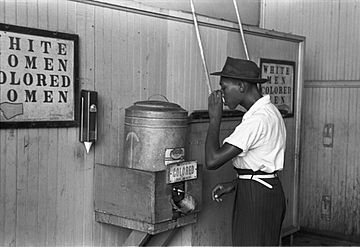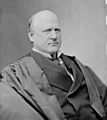Plessy v. Ferguson facts for kids
Quick facts for kids Plessy v. Ferguson |
|
|---|---|

|
|
| Argued April 13, 1896 Decided May 18, 1896 |
|
| Full case name | Homer A. Plessy v. John H. Ferguson |
| Citations | 163 U.S. 537 (more) |
| Prior history | Ex parte Plessy, 11 So. 948 (La. 1892) |
| Subsequent history | None |
| Holding | |
| Louisiana's law requiring segregation is constitutional under the 14th Amendment, as long as both races have "separate but equal" facilities | |
| Court membership | |
| Case opinions | |
| Majority | Brown, joined by Fuller, Field, Gray, Shiras, White, Peckham |
| Dissent | Harlan |
| Brewer took no part in the consideration or decision of the case. | |
| Laws applied | |
| Fourteenth Amendment; 1890 La. Acts 152 | |
|
Overruled by
|
|
| Brown v. Board of Education 347 U.S. 483 (1954) (partially overruled) | |
Plessy v. Ferguson, was a United States Supreme Court case that ruled segregation was legal, as long as equal facilities were provided for both races. The decision was handed down by a vote of 7 to 1. The majority opinion was written by Justice Henry Billings Brown, and the minority opinion was written by Justice John Marshall Harlan.
In 1954, Brown v. Board of Education partially overturned the Plessy v. Ferguson ruling.
Contents
Background
The State of Louisiana passed a law saying that whites and blacks had to ride in different cars on trains, but required that the train cars be "equal." Homer Plessy, who was one-eighth black (meaning that one of his eight great-grandparents was black) was arrested for riding in a whites-only car. He challenged the Louisiana law, saying it was against the United States Constitution. Plessy argued that the state law which required East Louisiana Railroad to segregate trains had denied him his rights under the Thirteenth and Fourteenth Amendments to the United States Constitution.
Decision
The Supreme Court, in a 7-1 decision, ruled that the Louisiana law was valid. They said that requiring whites and blacks to ride in separate trains did not harm blacks in any way. Justice John Marshall Harlan was the only justice who thought the law was against the Constitution. He thought segregation made blacks feel inferior. He said that the Constitution is "color blind" and that the law should not treat any group better than any other group.
Aftermath
After the Supreme Court ruling, Plessy's criminal trial went ahead in Ferguson's court in Louisiana on February 11, 1897. Plessy changed his plea to "guilty" of violating the Separate Car Act, which carried a $25 fine or 20 days in jail. He opted to pay the fine.
Significance

Plessy legitimized state laws establishing "racial" segregation in the South and provided an impetus for further segregation laws. It also legitimized laws in the North requiring "racial" segregation, such as in the Boston school segregation case noted by Justice Brown in his majority opinion. Legislative achievements won during the Reconstruction Era were erased through means of the "separate but equal" doctrine. The doctrine had been strengthened also by an 1875 Supreme Court decision that limited the federal government's ability to intervene in state affairs, guaranteeing to Congress only the power "to restrain states from acts of racial discrimination and segregation". The ruling basically granted states legislative immunity when dealing with questions of "race", guaranteeing the states' right to implement racially separate institutions, requiring them only to be equal.
Brown and Plessy
In 1954, the United States Supreme Court made it illegal to segregate schools by race. Chief Justice Earl Warren even ruled that ""separate facilities are [always] unequal.""
However, Brown did not make it illegal to segregate in any other places, aside from schools. Segregation in other places was still legal. This means that Brown overturned part of Plessy v. Ferguson by making school segregation illegal, but it did not overturn the entire law.
Related pages
Images for kids
-
John Marshall Harlan became known as the "Great Dissenter" for his fiery dissent in Plessy and other early civil rights cases.
See also
 In Spanish: Caso Plessy contra Ferguson para niños
In Spanish: Caso Plessy contra Ferguson para niños



